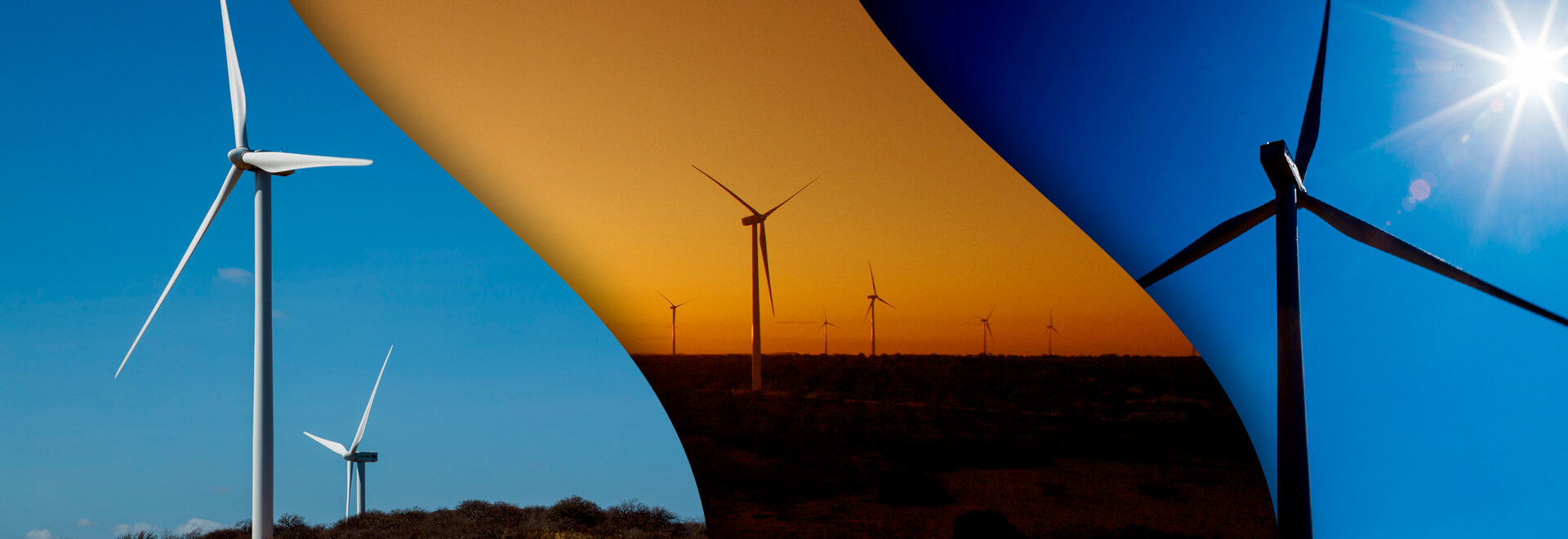
Why should companies invest in renewable energy?
Cost savings, brand value creation, contribution to sustainable development and compliance with ESG (environmental, social and governance) commitments are some of the advantages companies can gain by investing in renewable energy. Clean sources, especially wind and solar, are growing in the country and companies are essential to this expansion.
What is renewable energy?
In Brazil, more than half of the electricity grid is hydroelectric, meaning that most of the available energy comes from hydroelectric plants. However, the country has invested significantly in other clean energy sources.
Wind energy, generated by the force of the wind, has grown rapidly, especially in the Northeast, where conditions are highly favorable. In addition, solar energy has also shown great potential due to the high incidence of sunlight in several Brazilian regions. This has led to the construction of new solar plants and the multiplication of solar panels adopted in homes and businesses.
How to invest in clean energy?
Currently, electricity trading in the country can be done in two ways: in the Regulated Contracting Environment (ACR) or in the Free Contracting Environment (ACL). In the ACR, also called the captive market, consumers use the services of distributors and pay rates defined by the National Electric Energy Agency (Aneel) to cover operations from generation to distribution.
The ACL, known as the Free Market, is a more flexible model that allows the choice of supplier, with negotiated prices and contractual conditions. In both models, it is possible to opt for the use of renewable sources, but with different rules and solutions for each case.
Free energy and renewable energy market - Brazil is going through a period of liberalization of the sector, which means that more and more consumers can negotiate in the free energy market. In 2022, ordinance 50 authorized the contracting of all consumers in the so-called Group
The free energy market has been operating effectively since 1998 and currently has more than 40,000 consumer units (each one is equivalent to an energy meter). According to data from the Brazilian Association of Energy Traders (Abraceel), these customers had a record saving of R$48 billion in 2023 alone.
Renewable Energy Certificates - The purchase of Renewable Energy Certificates (I-REC, in the English acronym, or other modalities such as REC Brazil) is a way to encourage the generation of clean energy in addition to investments in the consumption of this electricity. The certificates are issued in Brazil by the Totum Institute and serve to certify generation from renewable sources.
Small and medium-sized companies - It is not only large companies that can contract clean energy. It is possible to sign up to the free market through the retail modality, a simplified solution.
Companies that do not meet the minimum demand to enter the free market can invest in renewable sources in the regulated market through distributed generation – a modality with a limit of 5 MW of installed capacity. It is possible, for example, to install solar systems on the roof of a property or contract the production of a power plant. The energy is converted into credits to result in discounts on the electricity bill.
Benefits of clean energy for companies
Taking action to combat climate change is a necessity for society as a whole, and companies can do their part by adopting initiatives such as reducing GHG emissions, which requires greater consumption of clean energy.
At a time when ESG practices are increasingly relevant, as demonstrated by the increase in searches for the term on Google, adopting renewable energy can contribute to the strategic positioning of companies, in addition to reflecting several advantages for them, the environment and the end consumer:
Reducing environmental impacts
Clean energy causes less harm to the environment. The adoption of renewable sources, such as solar, hydro and wind power, free of fossil fuels, helps to contain the increase in greenhouse gas emissions, which are harmful to nature and human beings.
Cost savings and predictability
The use of renewable sources can help reduce energy bills. For companies, the Free Market provides savings of up to 30% compared to the captive market, both in the short, medium and long term, in addition to budget predictability.
Issuing certificates and competitive valuation
By using green energy, companies can receive Renewable Energy Certificates (I-RECs), which allow for the traceability and accounting of the renewable energy consumed. These documents are highly valued by investors, customers and the market.
Positive image
Companies that invest in renewable energy are generally well regarded in terms of governance and sustainability standards. They tend to be reliable companies, from the point of view of reputation and indicators for investment policy.
Green bonds
Companies that invest in renewable energy are entitled to tax benefits and benefits related to obtaining credit in the capital market. Green bonds (or green bonds, for the international market) are one of the ways to raise the resources needed to finance investments in renewable energy and infrastructure.
Neoenergia offers solutions for companies
The expansion of the group's renewable generation portfolio reflects its positioning in the liberalization of the market, with a greater focus on projects aimed at the ACL. Neoenergia Luzia (PB), the company's first centralized solar complex, will have all of its energy sold on the free market, with 100% already sold by 2026
News
2025-12-12
Prêmio Brasil Olímpico 2025: Neoenergia reforça compromisso com esporte feminino no país
2025-12-09
Prêmio Aberje 2025: Neoenergia é campeã nacional com campanha sobre segurança na rede elétrica com Carlinhos Brown
2025-12-01
Exclusivo a mulheres negras, Prêmio Inspirar 2025, do Instituto Neoenergia, anuncia vencedoras em quatro estados e no DF
2025-11-27
Neoenergia e Honda se unem para acelerar uso do hidrogênio verde na mobilidade brasileira
2025-11-25
